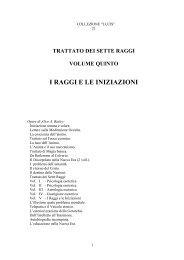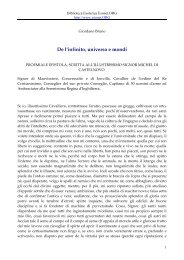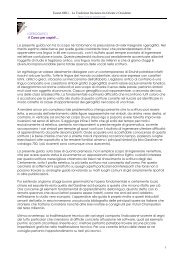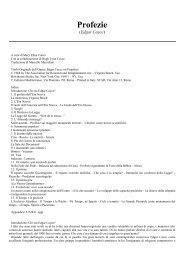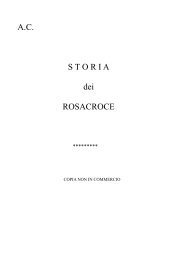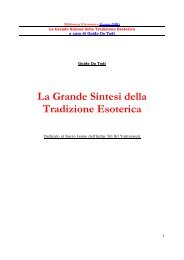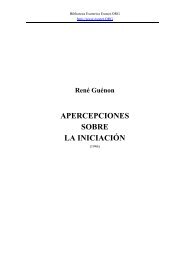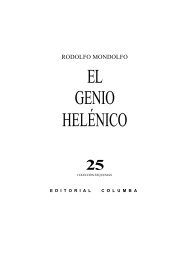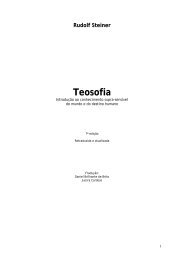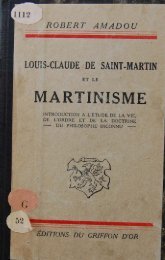Biblioteca Esoterica Esonet.ORG http://www.esonet.ORG 1
Biblioteca Esoterica Esonet.ORG http://www.esonet.ORG 1
Biblioteca Esoterica Esonet.ORG http://www.esonet.ORG 1
Create successful ePaper yourself
Turn your PDF publications into a flip-book with our unique Google optimized e-Paper software.
<strong>Biblioteca</strong> <strong>Esoterica</strong> <strong>Esonet</strong>.<strong>ORG</strong><br />
<strong>http</strong>://<strong>www</strong>.<strong>esonet</strong>.<strong>ORG</strong><br />
organization were not in general use. Neither was the term transpersonal which, I believe,<br />
I was the first to use in English in that series of articles. Today these terms are in common<br />
usage, but, alas, often with vulgarized meanings. In this book they are given what I<br />
consider to be their most significant philosophical meaning.<br />
In order to be understood fully, such meanings require a "new mind" — the "mind of<br />
wholeness." Also required is a still generally unfamiliar feeling-response toward<br />
interpersonal relationships and sociocultural issues — thus a new quality of being as one<br />
discovers oneself to operate both as a person living in society and a generically human<br />
organism affected by and affecting the biosphere of the planet Earth. My hope is that a<br />
careful, consistent, and sequential reading of the pages of this book will generate at least<br />
the desire — and perhaps the sustained determination — to develop such a mind of<br />
wholeness.<br />
This book introduces a relatively new type of relationship to other men and women, to<br />
nature, to our planet as a whole, and to what usually is pictured as God, a divine state of<br />
being, or a supreme Reality. Although basic ideas are rarely absolutely new, they must be<br />
reformulated and their implications for concrete existential transformation revealed anew<br />
culture after culture, century after century, and even generation after generation.<br />
To do so one must use words which have acquired definite, customary, and perhaps<br />
tradition-hallowed meanings. Unfortunately, this poses serious problems to a radical<br />
attempt to develop a new mind. Many readers assume that philosophical terms always<br />
carry the meaning with which they are familiar; they respond to new ideas by taking them<br />
out of context and using them to confirm ideas previously encountered. Therefore, it has<br />
been necessary for me to define as precisely as possible the different meanings I give to<br />
familiar terms for which no adequate and convincing alternatives can be found in our<br />
language.<br />
While reading this book, intellectual criticism of detail of formulation tends to be<br />
nonproductive, because the purpose of the presentation is not, I repeat, to convey a mass<br />
of data claimed to be objectively true. It is rather to introduce a kind of philosophical<br />
perspective which, consistently applied, allows the inclusion and understanding of all<br />
human experiences, both objective and subjective. In this connection, the book's subtitle —<br />
A Total Affirmation of Being — is most important. The rhythm of dynamic Wholeness<br />
always deals with "being"; it dismisses as irrelevant the concept of "non-being." Such a<br />
concept has meaning only if the term being is thought to apply solely to the objective<br />
universe. What follows the dissolution of this predominantly objective state of being is a<br />
predominantly subjective type of consciousness and activity. However, our existence in<br />
the universe is not exclusively objective, nor is what follows our death or that of the<br />
cosmos exclusively subjective. Reality, as presented in this book, is the unceasing, dynamic<br />
interplay of subjectivity and objectivity, of a principle of Unity and a principle of<br />
Multiplicity. It is neither Unity nor Multiplicity, neither spirit nor matter — separately.<br />
In order to understand clearly the implications of this and what it can mean in the<br />
practice of living, it is necessary for us to grasp the specific meaning of the ambiguous<br />
term unity. This will be explained in Chapter 2, where I also analyze the way I use the<br />
term Wholeness and the meaning of the traditional concept of the One. Nevertheless, I<br />
3



